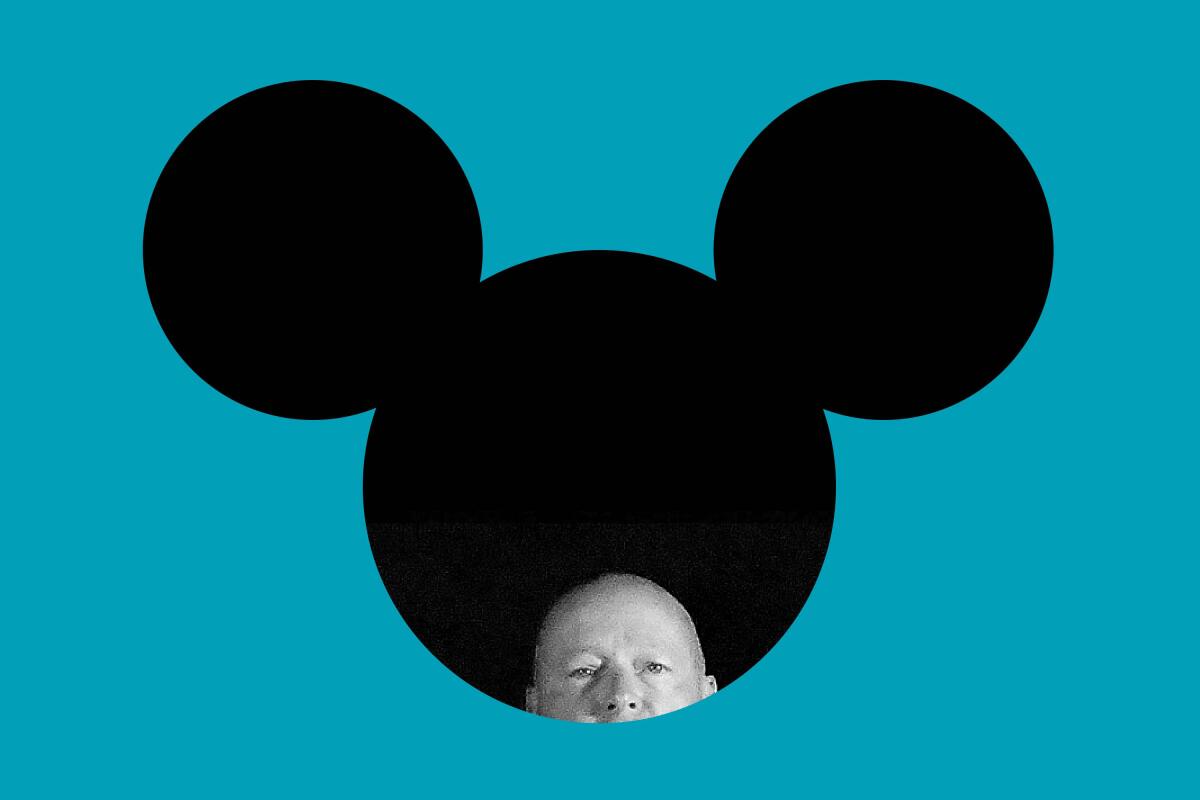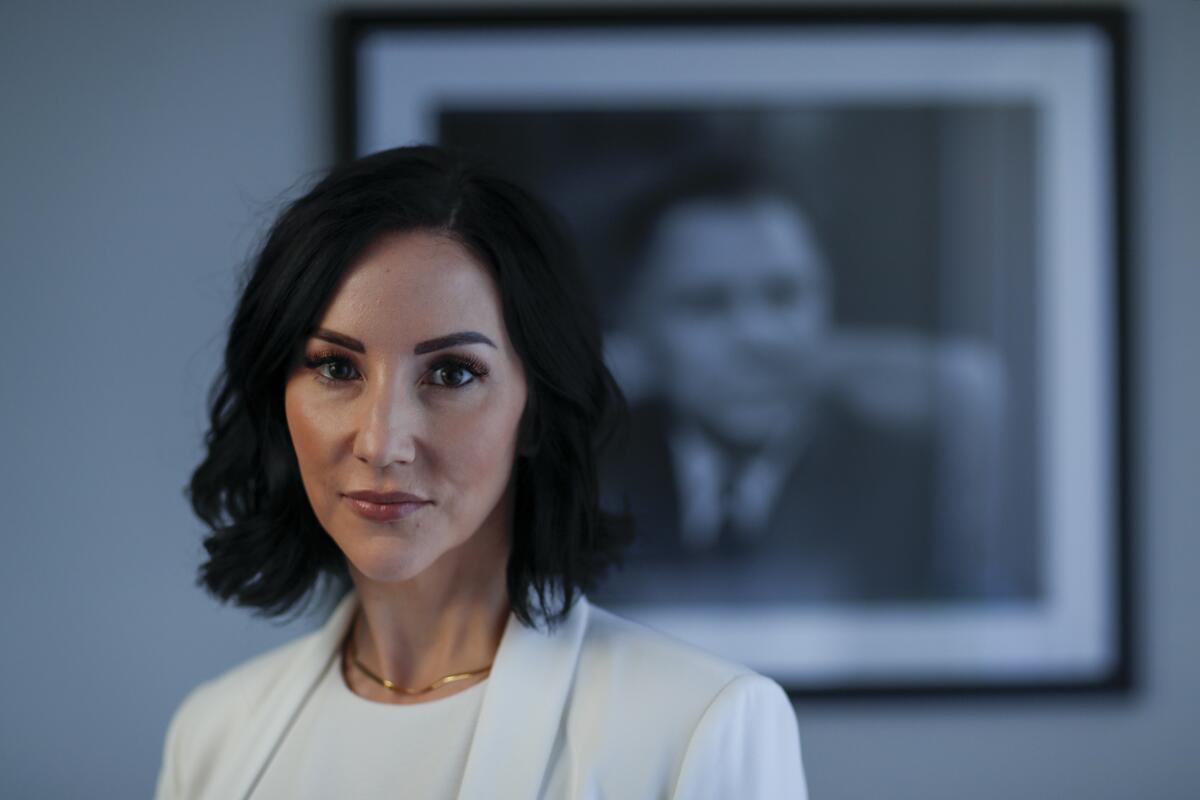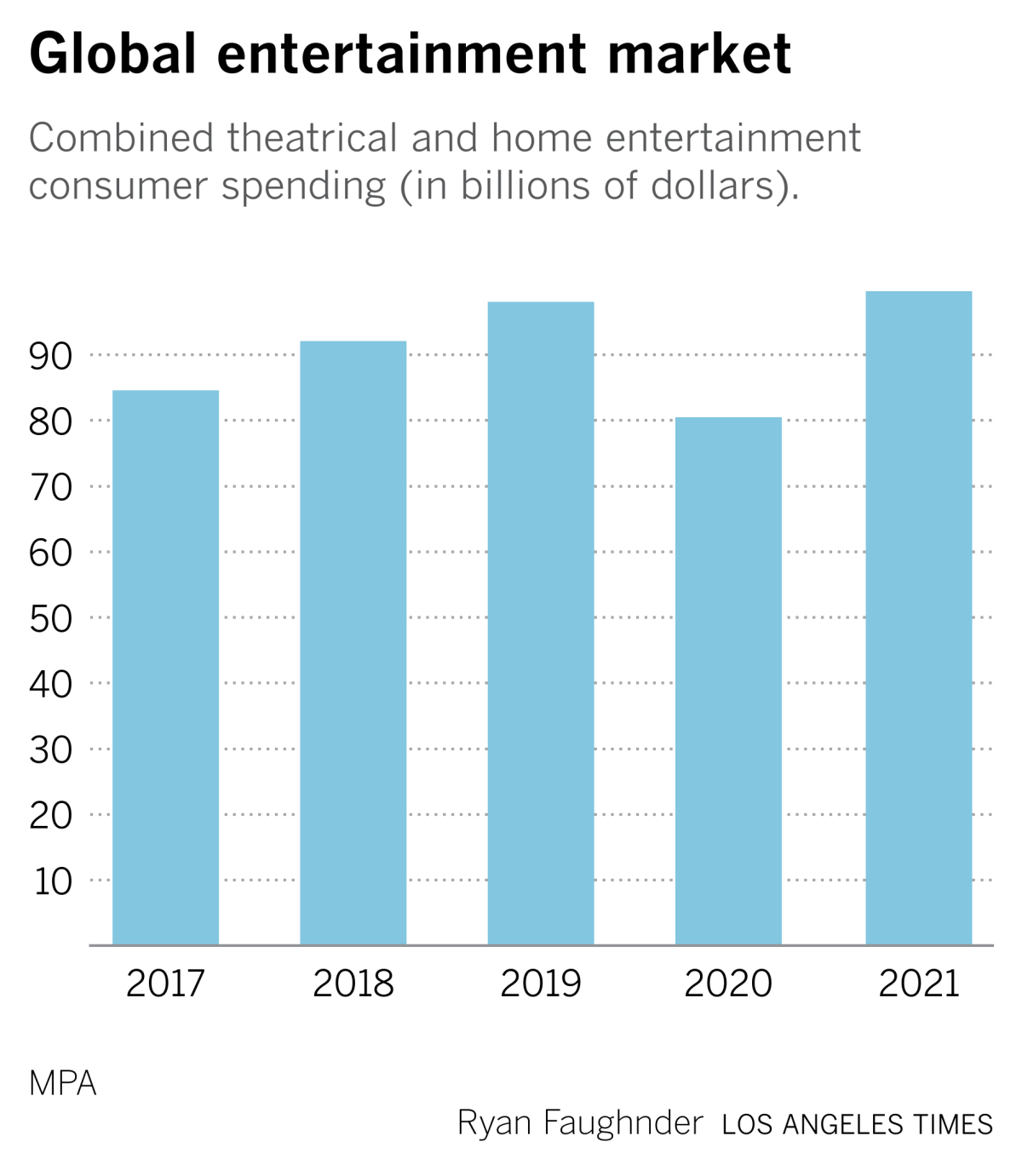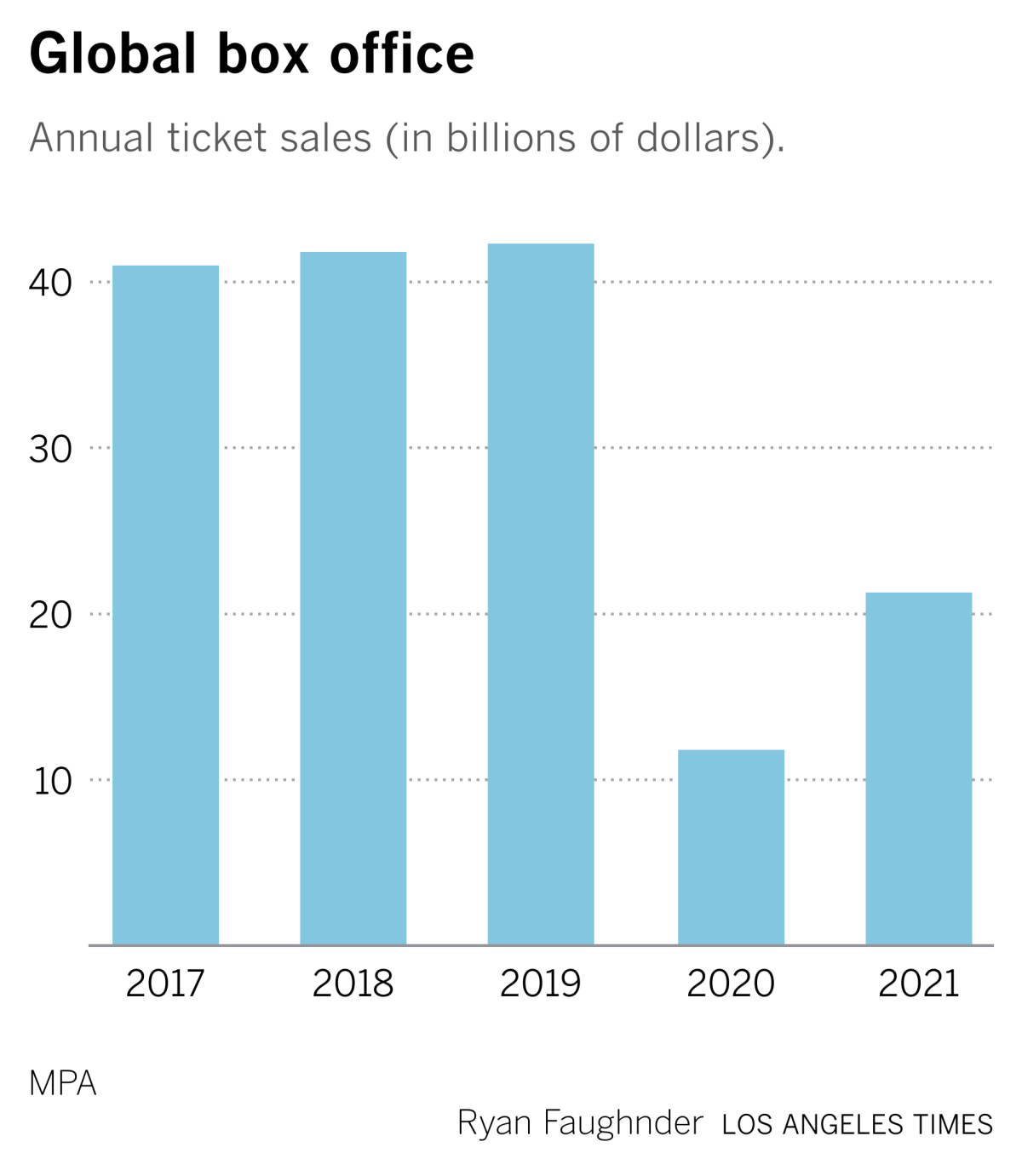After a Disney employee revolt, what’s next in the Chapek drama?

- Share via
Welcome to the March 15, 2022, edition of the Wide Shot, a newsletter about the business of entertainment. If this was forwarded to you, sign up here to get it in your inbox.
In my Saturday front-page article on Bob Chapek’s imbroglio over Florida’s so-called “Don’t Say Gay” bill, I wrote about how the Walt Disney Co. chief executive blundered in not anticipating the wrath of employees unafraid to take their leadership to task.
Higher-ups at companies across the corporate landscape are “increasingly contending with a socially conscious and internet savvy generation of employees who want their workplaces to reflect their most deeply held beliefs and are willing to say so online,” I wrote.
Now, a new week has begun, and with it, so has the Disney chief’s urgent task of repairing trust with the employees who said they were “disappointed, hurt, afraid, and angry” over the company’s refusal to condemn the legislation before it was passed by the state Legislature.
Chapek on Friday apologized to staff after a week of internal revolt over Disney’s outward neutrality on the state’s pending ban of classroom instruction on sexual orientation and gender identity. The prohibition would apply to kindergarten through Grade 3, and critics say the bill is vague enough to limit discussion in other grade levels.
Disney employees’ Slack activity, some of which was viewed by The Times, shows that while many staff members were heartened by Chapek’s apology (“a first step in the right direction,” read one internal message), there was still plenty of convincing left to do. Employees talked about the need to remain skeptical and “keep up the pressure.”
Questions remain about the actions Disney has promised to take. Chapek said in his apology email that the company was “pausing” all political donations in Florida amid a review of the company’s approach to advocacy after folks took Disney to task for donating to politicians in the state who supported the bill.
What does that pause mean for the future? Chapek said the company is “creating a new framework for our political giving that will ensure our advocacy better reflects our values.” What does that new policy look like? Will the broad pause on donations lead to something more permanent and targeted?
Disney, like many corporations, spreads its political dollars among Republicans and Democrats in places where it operates. So do companies like Universal Studios owner Comcast Corp. and WarnerMedia parent AT&T, which also donated to lawmakers who sponsored the Florida bill, according to state records.
Political compromises are baked into the cake of normal corporate giving, especially when companies operate theme parks worth billions in profits.
During Wednesday’s Disney shareholder meeting, Chapek said Florida Gov. Ron DeSantis had agreed to meet with him and a delegation of LGBTQ leaders. There’s been no update on that so far, and it’s unclear what would possibly come of it. DeSantis has strongly indicated his support for the bill and has blasted Disney for its public opposition, belated though it was.
DeSantis’ office and Disney did not respond to requests for comment Monday.
Chapek already faced heavy skepticism among a Hollywood crowd that had come to revere his predecessor Bob Iger as one of the great entertainment chief executives, if not a full-blown Mouse messiah. As my colleague Meg James and I wrote in December, one of Chapek’s biggest impediments to winning over the industry is that he’s not Iger, who not only transformed the company but also deftly navigated political minefields.
This episode did nothing to fix that problem. But Chapek’s longevity in the CEO job depends primarily on two things: subscriber growth for Disney’s streaming businesses and the company’s share price. How he deals with a changing workplace culture is an important but separate issue.
It was Iger — now in retirement and investing in a metaverse avatar company — who helped draw attention to Chapek’s reticence when he tweeted that the Florida bill “will put vulnerable, young LGBTQ people in jeopardy.”
Unshackled from having to run a public company, Iger didn’t mention Chapek in his tweet about Florida. But his outspokenness had the effect of putting the spotlight on his successor, who didn’t want Disney to be a political football. Which, of course, is exactly what it became.
The subsequent response by Disney put the company in a challenging position. LGBTQ advocates criticized the company for not taking a strong enough early stance on what they see as an issue not of politics but of human rights, and DeSantis attacked Disney’s “musings” as those of a hypocritical “woke” corporation.
It’s an uneasy dynamic that family-friendly Disney has dealt with for decades in order to cater to as many people as possible. Disney parks prohibited same-sex dancing until 1985, when the company quietly lifted the ban.
Early toe-dips into LGBTQ tolerance, including Michael Eisner’s defense of “Gay Day” celebrations at the parks (which Disney didn’t sponsor) and the coming out of ABC sitcom star Ellen DeGeneres, helped make it a target of the right.
This is not the last time that Disney — or Netflix, Spotify, Activision Blizzard, Nike or even Coca-Cola, for that matter — will be the center of a political firestorm that gets the Slack channels raging.
And as C. Kerry Fields, a USC Marshall School of Business professor and corporate ethics expert, explained to me, although companies shouldn’t too reflexively cave to employee outrage, they have to respect their staff, partly so they can attract, retain and groom talent.
“I think Chapek will learn from this,” Fields said. “The company has a duty to listen to their employees, because they reflect the concerns of their customers and community. And I think the company was slow to address this concern that was clearly expressed by so many people around Disney.”
News and more stuff we wrote

— Meet the woman who wants to transform Hollywood Teamsters into a ‘fighting union.’ Anousha Sakoui profiles Lindsay Dougherty, the first female leader of the union representing some 5,800 drivers, casting directors, location managers and other entertainment workers.
— Sports is streaming’s next big frontier. “Friday Night Baseball” is coming to Apple TV+ in a deal that gives the tech giant two games on Friday nights during the regular season.
— Alec Baldwin files an arbitration claim against ‘Rust’ producers. The actor is looking to shield himself from liability and cover his legal fees after the death of cinematographer Halyna Hutchins on the set of the western last year.
— Must-hear interview: “West Side Story’s” history-making, Oscar-nominated Ariana DeBose makes the case against “ethnically ambiguous” casting.
Number of the week

Here’s a figure that might gobsmack you: Discovery Chief Executive David Zaslav’s compensation jumped to $246 million in 2021, thanks to stock options granted through a new employment agreement he signed last year. Discovery is preparing to take over WarnerMedia, which is being spun off by AT&T.
Number of the week runner-up: The latest report from the Recording Industry Assn. of America shows that in 2021, recorded music revenues in the U.S. grew 23% to $15 billion in estimated retail value. Yea, streaming saved the music industry! Well, sort of.
RIAA’s Mitch Glazier gave the good news/bad news take in Music Business Worldwide:
“In nominal terms (not adjusted for inflation), that’s the highest annual revenue figure in our industry’s history, surpassing the $14.6 billion reported in 1999, just before digital piracy wiped out more than half of recorded music’s economic value. But in inflation-adjusted dollars, last year’s figure is 37% lower than it was in 1999. We still have plenty of room to grow — to reach and surpass historical values for music.”
To put it another way, said Syracuse University’s music business program director, Bill Werde, “Basically: It’s taken 10 years for the music biz to claw back just half of the value that illegal file trading and unbundling destroyed.”
Second runner-up: $99.7 billion
In 2021, the global box office began to recover, and the home entertainment market continued to grow. They hit a combined $99.7 billion in consumer spending, a 24% increase from the year before, according to the latest annual industry report from the Motion Picture Assn.
Global box office ticket sales grew 81%, to $21.3 billion, last year. But that was still about half the record of $42.3 billion the industry enjoyed in 2019, giving us an idea of how far the business has to go to get back to full strength.
Meanwhile, home entertainment kept growing, with consumer spending up 14%, to $78.5 billion. Streaming revenue and digital sales made up 72% of the combined theatrical and home entertainment market, compared to 46% in 2019.


Other key figures from the MPA report:
- More than 940 films entered production during 2021, an increase of 111% compared to 2020, when productions were hobbled by the COVID-19 pandemic.
- Men, who are generally less COVID-cautious than women, drove the box office recovery. Males made up the majority of the sales for top titles, including “Spider-Man: No Way Home” (59%), “Shang-Chi” (57%), “Venom: Let There Be Carnage” (60%), “Black Widow” (55%) and “F9” (67%).
Also: A24 secured a $225-million equity investment valuing the “Moonlight” studio at an estimated $2.5 billion.
You should be reading ...

— Move over, tennis: How pickleball became the preferred sport of the one percent. Brené Brown, Leonardo DiCaprio and Larry David are all playing — are you? (Town & Country).
By the way, The Times recently covered how pickleball noise is fueling neighborhood drama from coast to coast.
— For young female pop stars, dropping choice F-bombs in songs proves liberating and profitable. Times critic Mikael Wood dissects how Olivia Rodrigo, Gayle and Billie Eilish employ dirty words to great effect.
— The unexpected way ‘Love Is Blind’ is groundbreaking. The range of personalities exhibited by the parents of Asian American cast members challenges viewers to look at love outside Western forms of affection. (NBC News)
— Al Pacino on ‘The Godfather.’ Fifty years later, the actor looks back on his breakthrough role: how he was cast, why he skipped the Oscars and what it all means to him now. (New York Times)
Finally ... get puzzled
Times are stressful. I sometimes deal with it by playing puzzle games for hours on my iPhone. Yes, Wordle is in rotation. But my favorite as of late is Annapurna Interactive’s Gorogoa. First published in 2017, it uses a clever four-panel grid format and soothing music to create a lovely experience. My only complaint is that it is too short.
Inside the business of entertainment
The Wide Shot brings you news, analysis and insights on everything from streaming wars to production — and what it all means for the future.
You may occasionally receive promotional content from the Los Angeles Times.




